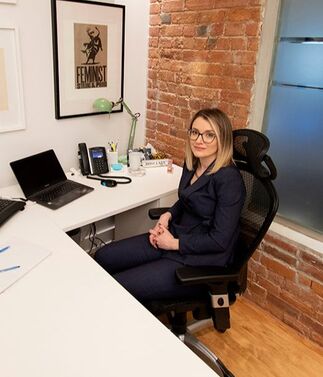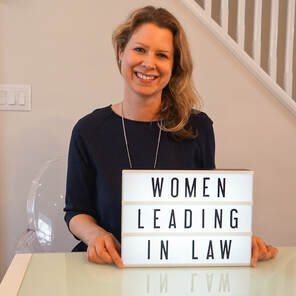 Welcome back to the Women Leading in Law series. Today the blog series profiles leading lawyer Sarah Molyneaux: another amazing lawyer who has started her own successful law firm and has chosen to practice law in a way that makes her happy. I love reading these stories! Her opening sentence says it all: 1. Tell me a little about your practice or business. I opened Molyneaux Law in early 2018 with the goal of bringing Hamilton workers, women and LGBT+ folks a local, woman-led option for high quality social justice legal representation. Today, it’s a family firm where I work together with my partner and a paralegal. We handle a broad range of workplace matters, predominately on behalf of unions and non-union employees. While I still enjoy ‘bread and butter’ labour and employment files, as my practice has become busier I have opted to focus on cases on behalf of women and queer workers who have faced pregnancy, parental status or sex/gender discrimination in the workplace and on assisting unions in respect of organizing campaigns. I’m grateful that growing our team has given me the opportunity to really concentrate on the work that is closest to my heart. 2. Why did you go to law school? I did not really know what a lawyer did when I applied to law school. I had never even met a lawyer! But my former high school debate coach and favourite professor both suggested a law degree after I told them my plans of becoming a war correspondent. In retrospect, they were right. I wanted a career where I could help vulnerable people be seen and heard, which I have found in law. 3. How did you get to where you are today? Design? Chance? Both? Like most people, I’d say it has been a combination of design and chance. I knew that I wanted to be a social justice lawyer, but I also knew that I did not know very much about being a lawyer when I started on that journey. I was (initially) prepared to be reasonably flexible about what my career would look like. However, in my 1L summer I was assigned to the Workers’ Rights Division at Parkdale Community Legal Services and truly found my niche – this happened by chance, because I had actually applied to work in the Immigration Division. Since that time, I have worked hard to develop the skills and knowledge needed to become a good labour, employment and human rights lawyer. This included a summer position at the Ministry of Labour, volunteering with the Workers’ Action Centre and Caregivers Action Centre, and articling at a union-side labour firm before being hired as an associate at a labour and employment boutique. I know that’s a path that I share with a number of union-side labour lawyers. Today, a lot of design goes into developing our still-young firm. We are deliberate about the type of law we want to practice and the way we want to practice, as well as the way we want to run our business. As social justice lawyers, we are very clear about who we are and this has helped us attract clients who share our values. We are honoured to benefit from a great deal of community support, too, and I believe that comes from our commitment to our feminist and pro-labour values. 4. What is your most significant achievement? What are you proud of? It may be too early to say. But I am proud that I have played a small role in other young women’s pursuit of careers in union-side labour law and litigation. I have already had the unique privilege of working with a handful of women law students and watching them develop as formidable lawyers in their own right. It is a special compliment to have women that I respect ask for my advice, whether it’s about a legal issue or a crossroads in their working life. 5. What are some key challenges, and more importantly, opportunities for women in law? I agree with so many of the other lawyers that you’ve profiled that one of the biggest challenges that women in law face is discrimination against mothers (or potential mothers) as well as aspects of law firm culture which make it exceedingly difficult to balance work and family responsibilities. On top of this, women lawyers continue to face a range of discriminatory conduct in our workplaces which ranges from microaggressions to egregious sexual harassment. For BIPOC women in law, these challenges are made worse by the experience of racism. It’s shameful that many members of our profession are not only hesitant to change but are openly hostile towards the idea of change in these respects. It’s unsurprising that many women leave law practice in favour of fields where they may have better working conditions. At the same time, there are opportunities for women in law. In my experience, women lawyers are eager to lift as they climb, offering mentorship and opportunities to others. This blog series is a great example of a woman lawyer offering up a platform to her peers. I know that the mentorship and friendship of other women lawyers has helped me in my career so far. 6. What advice would you give a woman starting her legal career? A successful legal career depends on you following your interests or passions and on doing so in a way that is practical. It is easier to excel when you care deeply about your work and your clients, but for many of us the intellectual demands of legal work require the peace of mind that comes with an ability to pay the rent. This is especially important for women who want to pursue a social justice-oriented practice or who want to hang out their own shingle or who, like me, want to do both. So, think about what type of work will reflect your values, but also think about how you can ensure that doing that work will be sustainable for you. For some lawyers, this means diversifying either their practice area or their client base. For others, it means establishing a very clear niche. It may mean experimenting – which will require you to be comfortable with the idea that some experiments will go better than others. Luckily, there is no one way to be a good lawyer and there is no rule that requires you to be the same type of lawyer for your entire career: you are allowed to try new things, to grow and to change. -------------------------------------------------------------------------------------------------------------------- Thank you very much for participating in this series, Sarah. I love all the different voices and opinions and advice that this series is producing. I wish this series was around when I started out in law :) I started this blog series because I was tired of hearing about women leaving law and wanted to hear about women leading in law. The "Women Leading in Law" series focuses on good news stories and highlights amazing women succeeding in the legal profession. Each post includes the profiled lawyer's answers to six questions. Prepare to be inspired! ICYMI - previous posts profiled the following amazing lawyers: Richa Sandill, Vivene Salmon, Kim Whaley, Alisia Grenville, Frances Wood, Maggie Wente, Anita Szigeti, Neha Chugh, Christy Allen & Nancy Houle, Suzie Seo, Kim Gale, Alexi Wood, Melissa McBain, Erin Best, Gillian Hnatiw, Melanie Sharman Rowand, Meg Chinelo Egbunonu, Lisa Jean Helps, Nathalie Godbout Q.C., Laurie Livingstone, Renatta Austin, Janis Criger, May Cheng, Nicole Chrolavicius, Charlene Theodore, Dyanoosh Youssefi, Shannon Salter, Bindu Cudjoe, Elliot Spears, Jessica Prince, Anu K. Sandhu, Claire Hatcher, Esi Codjoe, Kate Dewhirst, Jennifer Taylor, Rebecca Durcan, Atrisha Lewis, Vandana Sood, Kathryn Manning, Kim Hawkins, Kyla Lee, and Eva Chan.
0 Comments
Your comment will be posted after it is approved.
Leave a Reply. |
Erin C. Cowling is a former freelance lawyer, entrepreneur, business and career consultant, speaker, writer and CEO and Founder of Flex Legal Network Inc., a network of freelance lawyers.
Categories
All
Archives
June 2024
|
|
(C) 2014-2024 Cowling Legal. All rights reserved.
|
Please note I am not currently practicing law.
Information on this website does not constitute legal advice and is for informational purposes only. Accessing or using this website does not create a solicitor-client relationship. See website Terms of Use/Privacy Policy. |







 RSS Feed
RSS Feed
